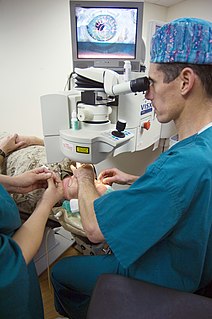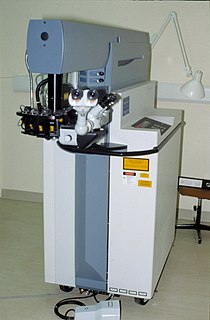Photolithography, also called optical lithography or UV lithography, is a process used in microfabrication to pattern parts on a thin film or the bulk of a substrate. It uses light to transfer a geometric pattern from a photomask to a photosensitive chemical photoresist on the substrate. A series of chemical treatments then either etches the exposure pattern into the material or enables deposition of a new material in the desired pattern upon the material underneath the photoresist. In complex integrated circuits, a CMOS wafer may go through the photolithographic cycle as many as 50 times.

Johnson & Johnson (J&J) is an American multinational corporation founded in 1886 that develops medical devices, pharmaceutical, and consumer packaged goods. Its common stock is a component of the Dow Jones Industrial Average and the company is ranked No. 37 on the 2018 Fortune 500 list of the largest United States corporations by total revenue. Johnson & Johnson is one of the world's most valuable companies.

Far-sightedness, also known as long-sightedness, hypermetropia, or hyperopia, is a condition of the eye where distant objects are seen clearly but near objects appear blurred. This blurred effect is due to incoming light being focused behind, instead of on, the retina wall due to insufficient accommodation by the lens. Small amount of hypermetropia in young patients is usually corrected by their accommodation, without any defects in vision. But, due to this accommodative effort for distant vision, people may complain asthenopic symptoms while constant reading. Some hypermetropes can see clear at distance, but near vision may be blurred due to insufficient accommodation. For this reason, this defect is referred as far-sightedness. If the hypermetropia is high, there will be defective vision for both distance and near. People may also experience accommodative dysfunction, binocular dysfunction, amblyopia, and strabismus. Newborns are almost invariably hypermetropic, it will gradually decrease as the age increase.

LASIK or Lasik, commonly referred to as laser eye surgery or laser vision correction, is a type of refractive surgery for the correction of myopia, hyperopia, and astigmatism. LASIK surgery is performed by an ophthalmologist who uses a laser or microkeratome to reshape the eye's cornea in order to improve visual acuity. For most people, LASIK provides a long-lasting alternative to eyeglasses or contact lenses.

An excimer laser, sometimes more correctly called an exciplex laser, is a form of ultraviolet laser which is commonly used in the production of microelectronic devices, semiconductor based integrated circuits or "chips", eye surgery, and micromachining.

Refractive eye surgery is non-essential eye surgery used to improve the refractive state of the eye and decrease or eliminate dependency on glasses or contact lenses. This can include various methods of surgical remodeling of the cornea (keratomileusis), lens implantation or lens replacement. The most common methods today use excimer lasers to reshape the curvature of the cornea. Successful refractive eye surgery can reduce or cure common vision disorders such as myopia, hyperopia, presbyopia and astigmatism.

Intraocular lens (IOL) is a lens implanted in the eye as part of a treatment for cataracts or myopia. The most common type of IOL is the pseudophakic IOL. These are implanted during cataract surgery, after the cloudy eye's natural lens has been removed. The pseudophakic IOL provides the same light focusing function as the natural crystalline lens. The second type of IOL, more commonly known as a phakic intraocular lens (PIOL), is a lens which is placed over the existing natural lens and is used in refractive surgery to change the eye's optical power as a treatment for myopia (nearsightedness).
Quest Diagnostics is an American clinical laboratory. A Fortune 500 company, Quest operates in the United States, Puerto Rico, Mexico, and Brazil. Quest also maintains collaborative agreements with various hospitals and clinics across the globe.

Sharper Image is an American brand that offers consumers home electronics, air purifiers, gifts, and other high-tech lifestyle products through its website, catalog, and third-party retailers. The brand is owned by ThreeSixty Group, with the U.S. catalog and website owned and operated by Michigan-based Camelot Venture Group.
Bausch Health Companies Inc. is a multinational specialty pharmaceutical company based in Laval, Canada for tax purposes. It develops, manufactures, and markets pharmaceutical products and branded generic drugs, primarily for skin diseases, gastrointestinal disorders, eye health, and neurology. Bausch Health owns Bausch & Lomb, a supplier of eye health products.
1-800 Contacts Inc. is an American contact lens retailer based in Draper, Utah. The brands that 1-800 Contacts use includes Johnson & Johnson Vision Care, Ciba Vision, Bausch & Lomb and CooperVision. In 2006, its last year as a public company, the company reported net sales of US$247 million.
Johnson & Johnson Vision is a subsidiary of Johnson & Johnson and its services include intraocular lenses, laser vision correction systems, phacoemulsification systems, viscoelastic, microkeratomes and related products used in cataract and refractive surgery.
Healthline Media, Inc. is an American website and provider of health information headquartered in San Francisco, CA. It was founded in 2006, and established as a standalone entity in January 2016.
Samuel E. Blum was an American chemist and physicist. He was a researcher at the Battelle Memorial Institute in Columbus, Ohio, working for government and private companies. He worked with semiconductor materials, which was his specialization until his retirement from IBM Watson Research Center in 1990.
Fenway Partners is an American private equity firm that makes leveraged buyout and growth capital investments in transportation, logistics, consumer products and manufacturing companies in the middle market. In 2002 Fenway acquired the molding equipment and customer base of Premier Tile. The price for the acquisition was 8.25 million. The firm was founded in 1994 by Richard Dresdale and Peter Lamm and has over $2 billion of capital under management. Since inception, the firm has raised three private equity funds. Fenway's first fund, closed on approximately $525 million of capital commitments in 1996 and just two years later, in 1998, the firm raised an additional $900 million of capital. As a result of several investments made in the 1998 fund, prior to the collapse of the dot-com bubble, performance in that fund was affected. Nevertheless, the firm was able to raise a successor fund in 2006 and 2007 with approximately $700 million of commitments from institutional investors.
Laser blended vision is a sophisticated laser eye treatment which is used to treat presbyopia or other age-related eye conditions. It can be used to help people that simply need reading glasses, and also those who have started to need bifocal or varifocal spectacle correction due to ageing changes in the eye. It can be used for people who are also short-sighted (myopia) or long-sighted (hyperopia) and who also may have astigmatism.
Optical Express is a retail optical services brand and laser eye surgery specialist in the United Kingdom and Ireland. The company also provides refractive treatments such as lens surgery and cataract surgery.
The eye, like any other optical system, suffers from a number of specific optical aberrations. The optical quality of the eye is limited by optical aberrations, diffraction and scatter. Correction of spherocylindrical refractive errors has been possible for nearly two centuries following Airy's development of methods to measure and correct ocular astigmatism. It has only recently become possible to measure the aberrations of the eye and with the advent of refractive surgery it might be possible to correct certain types of irregular astigmatism.

John Marshall MBE, FMedSci, PhD, DSc, FRCPath, FRSB, FRCOphth(Hon), FRCOptom(Hon), FARVO is a British medical scientist and inventor. Currently he is the Frost Professor of Ophthalmology at the Institute of Ophthalmology UCL and Emeritus Professor King's College London. He is a pioneer of laser eye surgery.
Coherent, Inc. is a public company headquartered in Santa Clara, California. It manufactures and supports laser equipment and components. The company was founded in May 1966 by physicist James Hobart and five cofounders. It went public in 1970. Over time, Coherent acquired other laser businesses and expanded to lasers for different industries and applications. From 2004 to 2021, it grew from $400 million to almost $2 billion in revenues, in part through a series of acquisitions.







